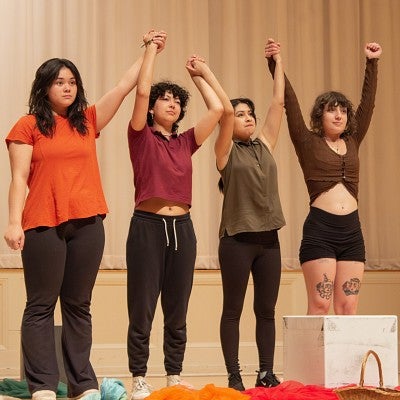
Students challenge the stereotypes of historical indigenous women through nontraditional performance
“I want to ensure that people of color, more importantly, women of color can feel safe enough to present something,” said Kat Sincuir Alvarez ‘23, as she reminisced on the sisterhood formed through preparing for their performance.
Sincuir Alvarez and three of her classmates performed a creative work at the Undergraduate Research Symposium in 2023, just a few months after first reading the play in a Latinx Theatre class led by UO Professor Theresa May.
The play “Princess Pocahontas and Blue Spots” critiques the misrepresentation of indigenous women in American myth, literature, and other media. It sheds light on deep-rooted violence, while uplifting indigenous women as creators and healers instead.
The students’ version was entitled “Embodied Indigenous Research: Pocahontas and the Blue Spots” and featured performances Quaye Dydasco ’24, Lily Gastelum ’24, Aaralyn Reed ’26, as well as Sincuir Alvarez. The performers were mentored by May, a professor of Food Studies, Native American Studies, and Theater Arts, and Marta Lu Clifford, the Elder-in-Residence at the Clark Honors College.
The four student performers extensively researched the historical characters they were to represent. Through their research and rehearsing, they came to realize just how important the symposium would be in showcasing the strength and the passion embodied by not just their characters, but women of color as a whole, Sinclair said.
When it came time to perform at the symposium, the group invited the entire audience on stage at the Beall Concert Hall to create an interactive environment for their performance. Together, the cast and the audience formed a circle, which is how indigenous stories are historically told. There was no stage left or stage right but instead the desire to create a communal experience.

“The intimacy of the audience and the performance was fun,” Sincuir Alvarez said. “I think for the audience it may have been a new experience but that’s why I think the play was fresh, impactful, and powerful.”
The Undergraduate Research Symposium was not new to Sincuir Alvarez. If not for the COVID-19 pandemic, she would have participated in the symposium every year of her academic journey. During the 2023 symposium, Sincuir Alvarez made a total of three presentations including her thesis, a short film, and the play.
“The symposium is a way to show merit and the product of the education received at the University of Oregon,” she said.
Sincuir Alvarez hopes that her experience participating in the symposium will help her create more spaces for people of color to feel comfortable and confident talking about their work in the future.
—By Kea Powell, UESS Communications
